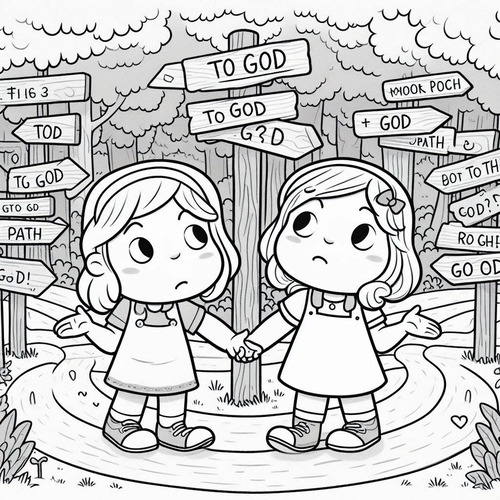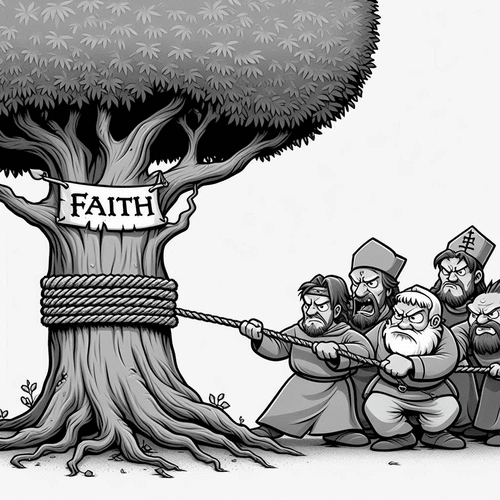Christian Answers to Atheist Objections: A Defence of Faith
Weighty Questions, Adequate Answers
In an age of skepticism and scientific advancement, Christians face increasingly challenging questions about their faith. How do we address complex objections from atheists and sceptics while staying true to our beliefs? This post explores thoughtful Christian responses to common criticisms, from the problem of evil to arguments against miracles. We’ll dive into how faith and reason can work together, offering a balanced perspective that respects intellectual inquiry while affirming the truth of Christianity. Whether you’re a believer seeking to strengthen your understanding or a sceptic open to dialogue, join us in seeking Christian answers to atheist objections.
CHRISTIAN ANSWERS TO ATHEIST OBJECTIONS
Complexity Does Not Imply Design
Objection: Just because something is complex, it does not necessarily imply it was designed. Natural processes can produce intricate structures without the need for an intelligent designer.
Response: While complexity alone does not prove design, it certainly points in that direction. The more we understand the staggering complexity and fine-tuning of the universe, the more difficult it becomes to attribute all of it to chance. The specified complexity we observe in nature, such as the information-rich DNA molecule or the intricate mechanisms of the human eye, suggests the work of an intelligent mind. Additionally, our own experience and intuition tell us high levels of specified complexity are typically the result of intentional design.
Scripture Is Not Proof
Objection: The Bible or other religious texts cannot be used as evidence for God’s existence, as they assume what they are trying to prove.
Response: We acknowledge Scripture alone cannot serve as definitive proof for those who do not accept its divine inspiration. However, the Bible’s historical reliability, prophetic fulfilment, and its enduring transformative impact on individuals and societies lend credibility to its claims. Additionally, the consistency of its message and the coherence of its worldview provide a compelling framework for understanding reality. Scripture can also be a powerful guide and complement to other lines of evidence.
Miracles Are Not Evidence
Objection: Miracles, by definition, violate the laws of nature and are therefore unreliable as evidence for God’s existence.
Response: This objection assumes a naturalistic worldview that excludes the possibility of supernatural intervention. If God exists as the Creator of the universe, it is reasonable to expect He would be capable of acting within His creation in extraordinary ways. The miracles recorded in Scripture, particularly the resurrection of Jesus Christ, were witnessed by multiple individuals and had a profound impact on their lives and the course of human history. Granted, miracles may defy our current understanding of natural laws, but they do not invalidate the possibility of a transcendent, supernatural reality.
Widespread Belief Is No Evidence
Objection: The fact that many people believe in God is not evidence of His existence, as beliefs can be misguided or based on cultural conditioning.
Response: Agreed, widespread belief alone is not sufficient evidence for God’s existence. However, the persistent and cross-cultural longing for the divine, expressed throughout human history and across diverse civilizations, is a phenomenon that demands explanation. The universality of religious experiences and the profound impact of faith on individuals and societies suggest there may be a deeper reality underlying these beliefs. While belief is not proof, the pervasiveness of religious sentiment and the transformative power of faith are factors worthy of consideration.
Science Provides Explanations
Objection: Science has provided naturalistic explanations for many phenomena previously attributed to God or the supernatural, rendering belief in God unnecessary.
Response: Science and faith are not inherently incompatible. While science has indeed expanded our understanding of the natural world, it operates within its methodological limits and cannot definitively address questions of ultimate origins, purpose, or the existence of a transcendent reality. Science describes the “how” of the physical universe, but it cannot fully answer the “why” questions that point to deeper meanings and purposes. Furthermore, many great scientists throughout history have found their scientific discoveries to be complementary to their belief in God as the ultimate source and sustainer of the laws and constants they observed.
The Problem of Evil
Objection: The existence of evil, suffering, and injustice in the world is incompatible with the existence of an all-powerful, all-loving God.
Response: The problem of evil is indeed one of the most challenging and emotionally charged objections to faith in God. However, the Christian worldview suggests evil and suffering are not part of God’s original design but rather, the result of human sin and of the brokenness in our fallen world. God’s love is demonstrated through His willingness to enter into human suffering through the incarnation of Jesus Christ, and ultimately overcome it through His death and resurrection. Additionally, the promise of eternal life and the restoration of all things provides hope and assurance that evil and suffering will not have the final word.
Argument from Inconsistent Revelations
Objection: The existence of diverse and conflicting religious revelations and beliefs casts doubt on the validity of any specific revelation, including the Christian one.
Response: While religious diversity is a reality, not all revelations are equal. The claims of Christianity rest on the historical events surrounding the life, death, and resurrection of Jesus Christ, which can be examined and evaluated using historical methods. Additionally, the transformative power of the Christian message, its ability to transcend cultures, and its positive impact on individuals and societies lend credibility to its truth claims. While respecting other belief systems, Christians can confidently assert the uniqueness and coherence of the Christian revelation.
Rejection of Unfalsifiable Concepts
Objection: Concepts like God, which are unfalsifiable and cannot be tested or disproven, should be rejected as they lack empirical evidence.
Response: While we acknowledge the importance of empirical evidence in many areas of inquiry, limiting our understanding of reality to only that which can be empirically tested would be an overly reductionist approach. There are aspects of human experience, such as consciousness, love, and aesthetics, that cannot be fully explained or falsified through empirical means alone. Additionally, the existence of a transcendent, metaphysical reality is not inherently contradictory to scientific inquiry, as science itself operates within a philosophical framework and relies on presuppositions that cannot be empirically proven. A holistic and open-minded approach to understanding reality demands that you don’t dismiss scientifically unfalsifiable concepts outright, but rather, that you explore them through various other modes of inquiry—such as philosophical reasoning, personal experiences, and the examination of historical evidence.
In seeking Christian answers to atheist objections, it is crucial to approach them with humility, respect, and a genuine desire to seek truth. While we may not have all the answers, we can present a thoughtful and winsome defence of our faith, rooted in reason, evidence, and a willingness to engage in respectful dialogue. Ultimately, our goal is not merely to win arguments but to plant seeds of understanding and to demonstrate the coherence, beauty, and transformative power of faith in Christ.
Related Reads
Editor's Pick

Why Do People Hate the Doctrine of Election?
…WHEN THEY REALLY SHOULDN’T Few Bible doctrines provoke stronger reactions than election. The idea that God chose some for salvation [...]

The Doctrine of Providence: Does God Really Govern All Things?
You’re sitting in the doctor’s office when the diagnosis lands like a thunderclap. Your mind races: Why this? Why now? [...]

No Decay, No Defeat: What It Means That Christ’s Body Saw No Corruption
On the Day of Pentecost, Peter stood before thousands and made a startling claim: David's body decayed in the tomb, [...]
SUPPORT US:
Feel the Holy Spirit's gentle nudge to partner with us?
Donate Online:
Account Name: TRUTHS TO DIE FOR FOUNDATION
Account Number: 10243565459
Bank IFSC: IDFB0043391
Bank Name: IDFC FIRST BANK






